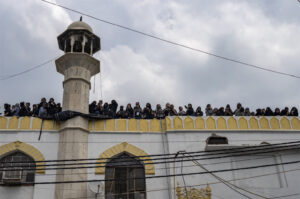 MOON Desk: More Indian Muslims face discrimination when accessing salaried jobs and income through self-employment compared to non-Muslims, according to a report by U.K.-based independent charitable organizations.
MOON Desk: More Indian Muslims face discrimination when accessing salaried jobs and income through self-employment compared to non-Muslims, according to a report by U.K.-based independent charitable organizations.
In rural areas, unemployment among Muslims increased by 17% compared to non-Muslims during the first quarter of the COVID-19 pandemic, bringing the rural Muslim unemployment rate to 31.4%, Oxfam stated in its “India Discrimination Report 2022,” which was released on Thursday.
While only 15.6% of the urban Muslim population aged 15 and above had regular salaried employment, nearly 23.3% of non-Muslims had regular salaried jobs in 2019-20.
Discrimination against Muslims in the labor market, which contributed to their low employment rate, rose to 68.3% in 2019-20.
The report shows that the discrimination faced by Muslims in 2004-05 was 59.3%, indicating an increase in discrimination by 9% over the last 16 years.
In addition, regular-salaried non-Muslims in urban areas earn an average of 20,346 Indian rupees (about $255), which is 49% more than Muslims, who earn 13,672 Indian rupees.
Self-employed non-Muslims earn 15,878 Indian rupees on average, while self-employed Muslims earn 11,421 Indian rupees despite their overrepresentation in urban self-employment. This means non-Muslims are earning one-third more than Muslims in self-employment.
The report said the Muslim population in urban India is mostly engaged in self-employment compared to other communities, largely because of the low-quality family professions and related difficulties in finding other options in the labor market.
“Marginalized communities are still visibly afflicted by discrimination as a result of their socio-religious and gender identities. Globally, the discussion around discrimination is based on racial inequities. Closer home, in India, discrimination is based on the gender, religion and caste location of individuals,” said Amitabh Behar, CEO of Oxfam India.





